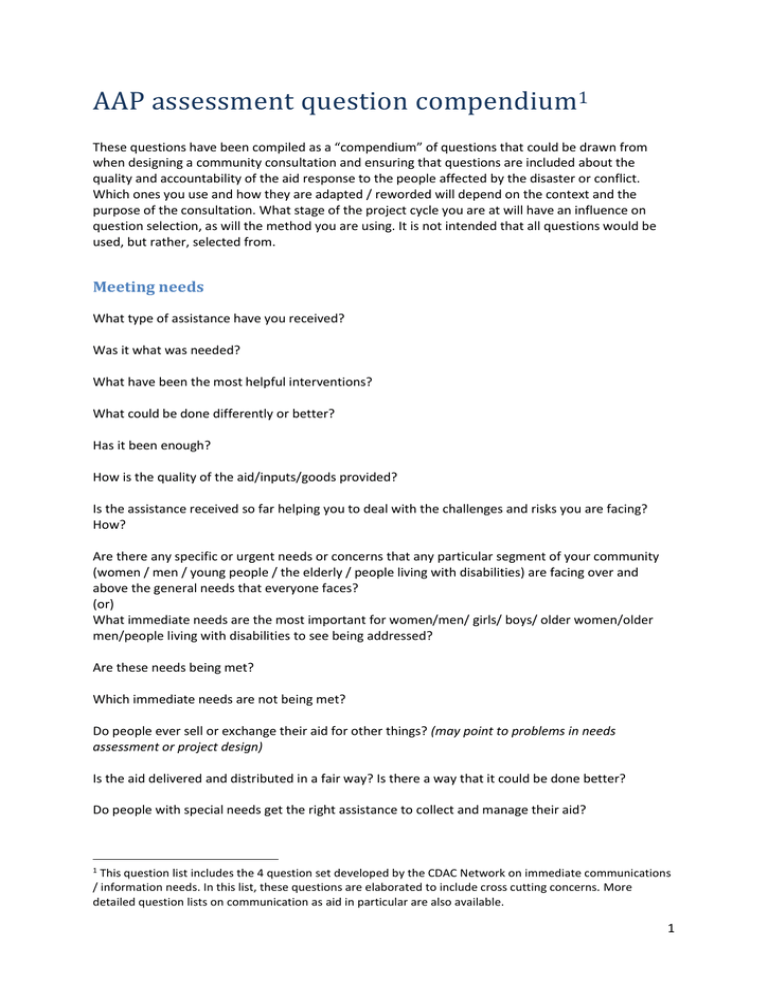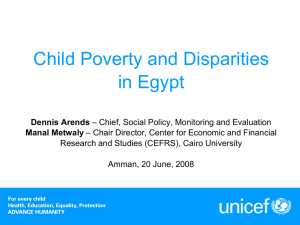Information and communication needs
advertisement

AAP assessment question compendium1 These questions have been compiled as a “compendium” of questions that could be drawn from when designing a community consultation and ensuring that questions are included about the quality and accountability of the aid response to the people affected by the disaster or conflict. Which ones you use and how they are adapted / reworded will depend on the context and the purpose of the consultation. What stage of the project cycle you are at will have an influence on question selection, as will the method you are using. It is not intended that all questions would be used, but rather, selected from. Meeting needs What type of assistance have you received? Was it what was needed? What have been the most helpful interventions? What could be done differently or better? Has it been enough? How is the quality of the aid/inputs/goods provided? Is the assistance received so far helping you to deal with the challenges and risks you are facing? How? Are there any specific or urgent needs or concerns that any particular segment of your community (women / men / young people / the elderly / people living with disabilities) are facing over and above the general needs that everyone faces? (or) What immediate needs are the most important for women/men/ girls/ boys/ older women/older men/people living with disabilities to see being addressed? Are these needs being met? Which immediate needs are not being met? Do people ever sell or exchange their aid for other things? (may point to problems in needs assessment or project design) Is the aid delivered and distributed in a fair way? Is there a way that it could be done better? Do people with special needs get the right assistance to collect and manage their aid? 1 This question list includes the 4 question set developed by the CDAC Network on immediate communications / information needs. In this list, these questions are elaborated to include cross cutting concerns. More detailed question lists on communication as aid in particular are also available. 1 If you were the boss of the aid response / aid organisation for a week, what would you do to improve the response / make the response even better? Targeting and selection Who chose and registered the recipients of the aid? Were people informed about the process that was used to target the people who would receive assistance? (Note if the respondents were actually involved in the targeting or not.) What do you think of it? Was the beneficiary selection process fair and transparent? How should the targeting process be improved? Are the people who really need it getting the assistance they need? Are there people who are getting assistance who should not be? If yes, why? (may point to problems of targeting, or of information) Information and communication needs (communication as aid) There are many different things the community needs to know in an emergency. What are the main issues your community needs to know about? Are there any specific things that women / men / young people / the elderly / people living with disabilities need to know urgently? What are the main sources of information available to your community now? Of these, which sources do people trust the most? Is that the same for women and men? What, if anything, is preventing people from getting the information they need now? Is that the same for women and men? Are any other groups / segments of the community having more trouble than others accessing information? Are any of your community’s regular media sources affected by the crisis? How are they affected? Information provision (communication as accountability) Do you feel well informed about the agencies providing the assistance? What agencies are responding here and what kind of assistance are they providing? (good to get an idea of really how much information people are getting) Do you know the difference between them and who is responsible for what? Do you get the information you need regarding the assistance, and regular updates? Is information delivered in the best way for this community? How could information delivery be improved? (In what formats?) 2 If people can’t read, how do they prefer to find out about things? Did you get told about your rights and entitlements? Have you been told about the codes of conduct that aid workers are obliged to follow? Do you understand what that means? Have you been told what sexual exploitation and abuse by aid workers is? Are you aware that there is a strong commitment by all the agencies providing aid to prevent that from happening? Have you been told what to do if it occurs? What other information would be useful for you to receive about the aid agencies and the aid programmes? (How could information content be improved?) Is information delivered with the needs of women and men in mind? Is information available in the places where women will go? How would people with special needs get the information they need to make decisions and receive their full entitlements and assistance? Complaints / Prevention of sexual exploitation and abuse How do people in this community normally complain about things? Is it different for men and women? If someone had a private or sensitive matter to complain about, that they didn’t want to share with others in the community, how would it be best for them to do that? Do you know of anyone who received assistance who had to pay or exchange favours or services for them? If you had a complaint about an aid worker, would you know how to identify what agency they worked for and how to contact that agency to make a complaint? Would you feel confident to make that complaint? If you wanted to contact the aid agencies about anything – for questions or comments or feedback, is there a way for you to do that? Is there a way to improve getting your / the community’s feedback and input? Do agencies ever let you know what they did with the feedback you gave them? Access and safety Have you been able to access assistance when needed? If not, what obstacles have you encountered? 3 Have you had any safety problems when accessing assistance? Have you heard of other people having safety problems? If yes, have these been while traveling to or from assistance sites or at the sites? How well is safety being addressed? What could be done better? How long does it take you to travel to and from the distribution? Are you incurring costs to get to distributions? Have you heard of any cases of conflict or violence within families or in the wider community that were caused by aid received, or not received? Participation and feedback Do you get asked for your ideas and opinions regarding the aid programmes? Often enough? If there is a system of community representation, is it fair and effective? Do all interest groups have the chance to have a say in those systems? Do you know how the people representing the community were selected? Are you satisfied with the way in which your community representatives inform you about what is going on and the decisions that are made? Do they seek your input as much as you would like? How could they do it better? Do the aid agencies or others providing assistance ask ordinary people, as opposed to the community leaders, their opinion about what they need and how things are going? Do the aid agencies or others providing assistance make a point to ask women / men / young people / children / the elderly / people living with disabilities their opinion about what they need and how things are going? Design, monitoring and evaluation Did the agencies explain how the needs the community identified are being met through the programmes? Do the agencies regularly ask people how the aid is going and if things are working well? Do the agencies check that you received what they said you would? Do the agencies make changes to programmes along the way and explain why? 4






